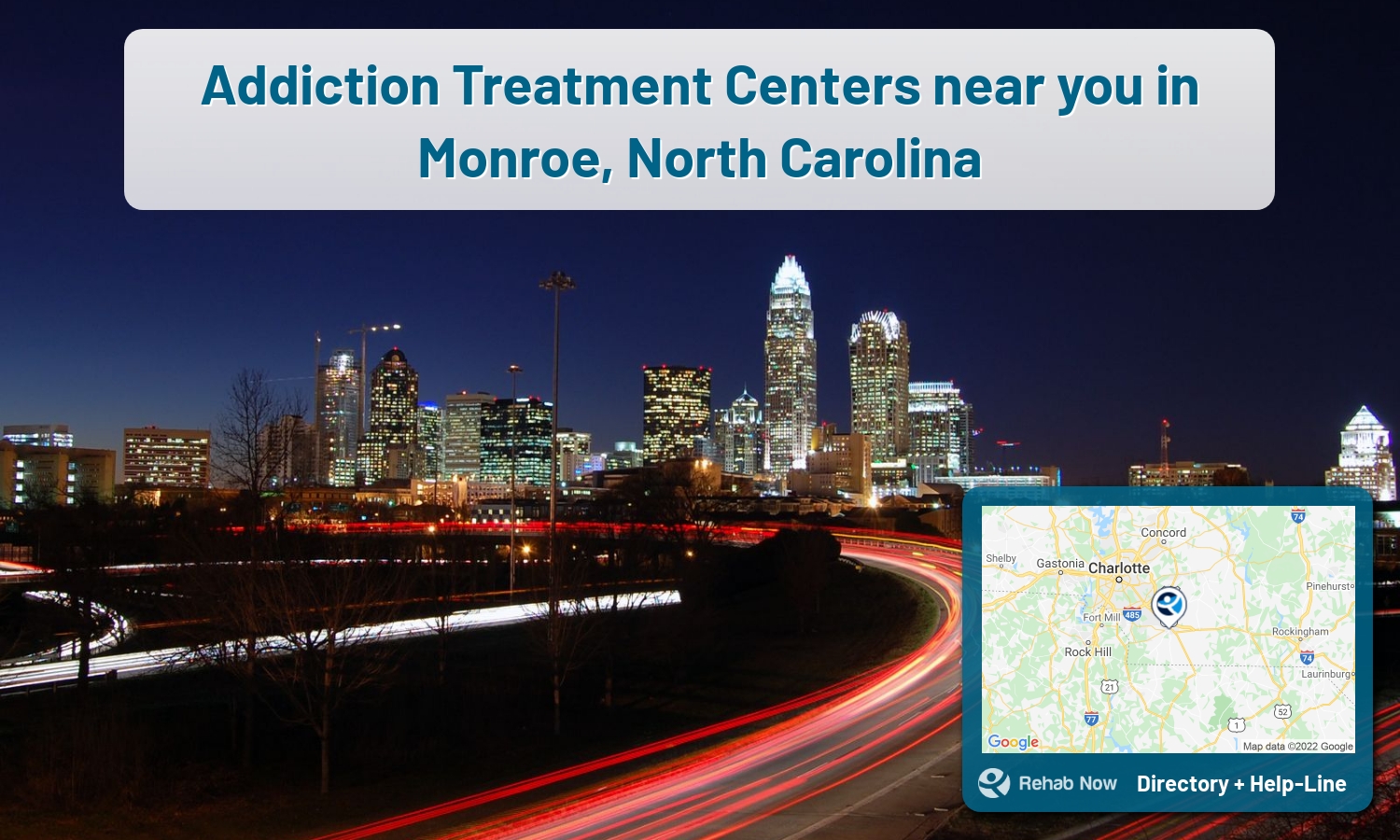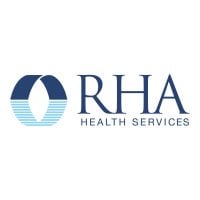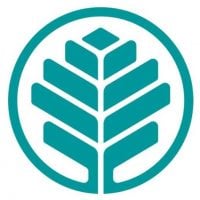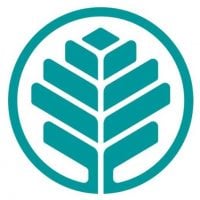Find An Addiction Rehab Center In Monroe, North Carolina Today
The drug addiction problem in Monroe, North Carolina, is severe. According to the National Institute on Drug Abuse, over 2,000 overdose deaths in North Carolina in 2016. That’s a rate of nearly 15 deaths per 100,000 people.
Drug addiction and abuse have a big impact on the community in Monroe, North Carolina. According to recent statistics, drug addiction and abuse rates in Monroe, NC, are increasing. This is causing problems for families and the community as a whole. Drug addiction and abuse can lead to crime, violence, and health problems.
Through a number of opioid and alcohol recovery programs available in North Carolina, healing and a healthier life are possible in Monroe. Check out a facility on our list below that suits your needs, or contact us for individualized assistance.
Contact an Admissions Expert Today, Free.
We will help you find treatment based on your location, budget, and specific needs and help you get started safely.
Free + Confidential Consultation
Browse 12 Centers in Monroe, North Carolina
McLeod Addictive Disease Center - Monroe
The McLeod Addictive Disease Center - Monroe has been providing comprehensive care for individuals with addictive diseases since 1960, offering evidence based treatments and individualized care plans, accredited by CARF, SAMHSA and holding a state license, and accepting private health insurance.



McLeod Addictive Disease Center - Monroe is an accredited facility with experienced staff and state-of-the-art technology offering personalized treatment for addiction and substance abuse, including detox, drug rehab, and outpatient treatment, using evidence-based therapies and aftercare support.



RHA Health Services - Monroe in Monroe, North Carolina provides comprehensive addiction treatment services, including detox, rehab, and outpatient programs, with personalized and evidence-based care for individuals suffering from Alcoholism, Dual Diagnosis, Opioid Addiction, and Drug Addiction, accepting private health insurance.

At Atrium Health Behavioral Health - Monroe, a JCAHO-accredited addiction treatment facility in Monroe, NC since 1951, they provide comprehensive drug rehab services including inpatient, outpatient, partial hospitalization, and detox support, as well as education and resources for families supporting a loved one's recovery journey.

Daymark Recovery Services - Monroe Crisis Recovery is a CARF-accredited addiction treatment center that offers residential and outpatient services, evidence-based therapies, and comprehensive aftercare support to individuals struggling with substance use and dual-diagnosis.

BHC First Step is a comprehensive Addiction Treatment Facility in Monroe, NC providing a personalized treatment program with Aftercare Support and educational and therapeutic sessions to help individuals overcome their substance abuse issues.
Daymark Recovery Services - Monroe Union Center
Daymark Recovery Services - Monroe Union Center offers various evidence-based and outcome-oriented addiction treatment programs, including drug rehab, intensive outpatient, and outpatient services, which accept private health insurances and work with family members and support systems to empower individuals to seek recovery and live healthy, addiction-free lives.
Daymark Recovery Services - Union Center delivers comprehensive, individualized drug rehab programs tailored to the unique needs of each client that range from inpatient to outpatient options and include therapy, counseling, medication-assisted treatment, and other evidence-based approaches, with a compassionate and supportive team of professionals and CARF accredited services that accept private health insurance.

Atrium Health Behavioral Health-Monroe provides evidence-based, accredited addiction recovery programs on varying levels of intensity, including a detox program and therapies such as 12-step programs, individual therapy, and group activities, and they accept private health insurance.

CD and CS
The Carolina Counseling and Development (CCD) Center for Substance Abuse in Monroe, NC offers comprehensive, individualized substance abuse treatment services in an outpatient setting and long-term residential care options tailored to each client's needs.
Chemical Dependency Services
Chemical Dependency Services in Monroe, NC provides comprehensive and customized addiction treatment services, including individual therapy and residential long-term care, with a focus on non-judgmental individualized care to best meet patient needs.
Friendship Home
Friendship Home provides addiction treatment services in Monroe, North Carolina, with a range of evidence-based approaches including therapies and long-term support of more than 30 days.
Information About Substance Abuse and Addiction in Monroe, NC
For many years, substance abuse and addiction have been a problem in Monroe, NC. According to recent data, approximately 9% of Monroe, NC, abuse drugs, and 19% of people in Monroe, NC, are addicted to drugs. These numbers are higher than the national averages.
Monroe, NC, the most commonly abused drugs are alcohol, marijuana, cocaine, heroin, and prescription drugs.

What types of treatment are available in Monroe, North Carolina?
There are various addiction treatment programs available in Monroe, North Carolina. Some of the most common types of treatment include inpatient treatment, outpatient treatment, and 12-step programs. Inpatient treatment involves staying at a treatment facility for a while, usually 30 days. During this time, you will receive 24-hour care and supervision. Outpatient treatment involves attending therapy sessions and meeting with a counselor regularly but living at home. 12-step programs are popular among those recovering from addiction.
There are many different types of addiction treatment available in Monroe, and people can find the best program for their needs. Life after getting sober can be rewarding, and people in Monroe are friendly and supportive. There are many different types of activities to do in Monroe, and people can find a place to live that is peaceful and quiet. Many resources are available to help people in Monroe get sober, and life after getting sober can be wonderful.
Drug Abuse Statistics in Monroe, North Carolina
Drug abuse is a significant concern in North Carolina, ranking third for drug-related deaths. Roughly 2,500 people die each year due to their addiction to drugs or alcohol. This number includes accidental overdoses, homicides, and suicides related to substance use disorder. In 2017, there were over 10,000 people hospitalized due to drug overdoses. This is a drastic increase from just a few years prior, in 2014, when there were only 5,000 hospitalizations.
- Substance abuse admissions to publicly funded treatment programs increased by 122%, making it the third fastest-growing state in the nation.
- In 2007, 1.6 million people aged 12 or older needed but did not receive care for a substance abuse problem.
- Approximately 10% of incarcerated individuals in state prisons reported using drugs at the time of their offense.
- In 2015, 1,077 people died from overdoses – a rate of 14.4 deaths per 100,000 people.
Additional Treatment Centers in North Carolina
North Carolina ranks 29th in the nation for overall substance abuse. Many of the drugs abused in the state are illicit, and many of these are opioids. Prescription opioids are readily available due to the high rates of medical workers prescribing them. The number of prescriptions has increased tenfold since the 1980's. Opioid overdoses are the most common type of death in North Carolina.
Still haven't found the right recovery center? Browse nearby North Carolina cities.
- Shelby, NC (58.6 mi.)
- Murphy, NC (196.8 mi.)
- Fuquay-Varina, NC (107.1 mi.)
- Banner Elk, NC (108.7 mi.)
- Gold Hill, NC (37.7 mi.)
- Greenville, NC (185.1 mi.)
- Pinehurst, NC (63.1 mi.)
- Clayton, NC (126.8 mi.)
- Oxford, NC (142.7 mi.)
- Leicester, NC (128.6 mi.)
- Corolla, NC (282.1 mi.)
- Holly Springs, NC (107.1 mi.)
- Charlotte, NC (78)
- Greensboro, NC (58)
- Raleigh, NC (56)
- Durham, NC (56)
- Wilmington, NC (50)
- Fayetteville, NC (48)
- Asheville, NC (41)
- Winston Salem, NC (29)
Comprehensive Drug Rehabilitation Programs in Monroe, NC
Monroe, NC, has a few addiction treatment centers that offer comprehensive drug rehabilitation programs. These programs include detoxification, individual and group counseling, and aftercare services.
Detoxification is the first step in most drug rehabilitation programs. This process can help rid the body of harmful toxins from drug abuse. Individual and group counseling can help addicts learn how to cope with their addiction and triggers that may lead to a relapse. Aftercare services can support those who have completed a drug rehabilitation program and are working on maintaining their sobriety.
Which drug addictions are treated at drug treatment centers in Monroe, NC?
The most common addictions treated at Monroe, NC, drug treatment centers are alcohol, cocaine, and marijuana. However, any addiction can be treated at a drug treatment center.
Traveling outside of Monroe, NC, for Drug Addiction Treatment
If you are traveling outside of Monroe, North Carolina, for drug addiction treatment, there are a few things you should keep in mind.
- Make sure to do your research before selecting a treatment center. There are many options available, and it is important to find one that fits your needs.
- Make sure to have a support system in place. It is important to have people you can rely on for help and support during your recovery.
- Make sure to be prepared for the cost of treatment. Addiction treatment can be expensive, and it is important to make sure you have the resources you need to pay for it.
- Make sure to be patient. Recovery is a process, and it takes time. Be patient with yourself and your loved ones as you go through this journey.
When to Get Help for Drug Addiction in Monroe, North Carolina?
If you are wondering when to get help for drug addiction, it is important to know that there is no one-size-fits-all answer to this question. Different people will need treatment at different points in their addiction, and some people may never require treatment. However, if you are struggling with drug addiction and are unsure whether or not you need help, here are some signs that it may be time to seek treatment:
- You have unsuccessfully tried to quit using drugs on your own.
- Your drug use is causing problems in your life.
- You are using drugs to cope with trauma or stress.
- You are experiencing legal problems because of your drug use.
- You are struggling with mental health issues along with your addiction.
What are the benefits of rehab facilities in Monroe, NC?
There are many benefits of rehab facilities in Monroe, NC. Some of these benefits include:
- Receiving top-notch care from qualified professionals.
- Getting the support you need to overcome addiction.
- Having access to a variety of treatments and interventions.
- Receiving 24/7 care and support.
- Gaining insight into your addiction and learning how to overcome it.
- Forming positive relationships with others in recovery.
- Building a foundation for long-term sobriety.
- Experiencing a sense of hope and possibility for the future.
What happens after rehab in Monroe, North Carolina?
When someone completes a rehab program in Monroe, North Carolina, they will likely have to participate in some form of aftercare. This could involve attending support group meetings, seeing a therapist, or continuing to take medication. Aftercare is important because it can help people stay sober and avoid relapses. It can also provide support and assistance during difficult times.
What is one of the most important things I can do after leaving a facility in Monroe, NC?
After leaving a treatment center in Monroe, NC, the most important thing you can do is continue your treatment. This means that you should attend meetings, therapy sessions, and any other type of support group that is offered to you. You should also continue using the coping skills you learned in treatment. It is also important to stay away from people and places that trigger your addiction.
Our experts can help you find treatment now in Monroe, North Carolina. We list drug rehab and alcohol centers in North Carolina. (888) 674-0062.





